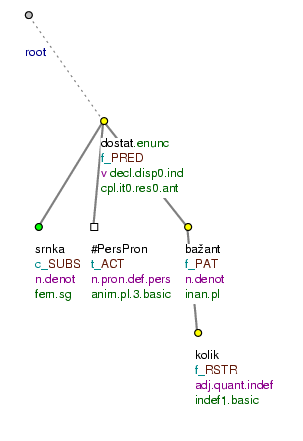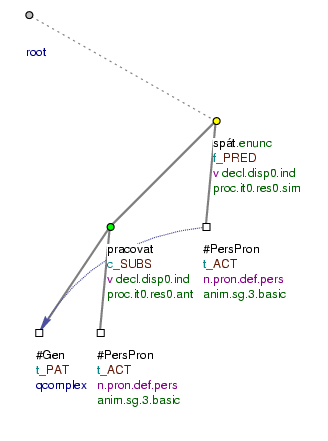- Definition of the functor
SUBS -
The functor
SUBS(substitution) is a functor for a free modification expressing that certain entity (event, state, person or object) has been substituted, replaced by some other entity (event, state, person or object).
The SUBS modification mainly modifies verbs.
Forms. The basic forms of modifications with the functor SUBS are:
-
prepositional phrase.
The most common forms:
jménem+2 Libuše Šroubková jménem firmy Inreka předala vedení základní školy Na Hanspaulce deset nových tříd. (=Libuše Šroubková in the name of the Inreka company handed over ten new classrooms to the basic school Na Hanspaulce.) místo+2 Do učeben zasednou otcové místo svých synů, kteří odjedou domů a starají se o statek. (=The fathers will sit in the classrooms instead of their sons, who will go home and take care of the farms.) namísto+2 Namísto očekávaných statisíců Moskvanů přišlo své vojáky uvítat jen dva a půl tisíce lidí. (=Instead of expected hundreds of thousands of Moscow inhabitants, only 2500 people came to welcome their soldiers.) v zastoupení+2 IRA v zastoupení svého politického křídla strany Sinn Fein rozhodně k jednacímu stolu nepřistoupí s prázdnýma rukama. (=IRA on behalf of its political wing, Sinn Fein party, will definitely not approach the discussion table with empty hands.) výměnou za+4 Irští republikáni budou výměnou za příměří požadovat stažení části kontingentu ze Severního Irska. (=The Irish republicans will ask for evacuation of a part of the contingent in exchange for the cease-fire.) za+4 Mám-li ovšem mluvit za sebe, trochu maluji a píšu. (=But should I speak for myself, I paint and write a little.); Za otce jednal strýc. (=The uncle acted on behalf of my father.) Example:
Výměnou za srnku.
SUBSdostali několik bažantů. (=In excahnge for the deer they got a few feasants.) Fig. 7.53 -
dependent clause.
The most common forms:
místo (toho) - aby Svobodná inteligence musí spolupracovat a pomáhat, místo aby se posmívala.; Místo toho, aby v zájmu veřejnosti působily na činnost svěřených institucí, zaměřují obě rady většinou svou energii směrem opačným. (=Instead of organizing the actions of the institutions they are responsible for, both the committees direct their energy in the opposite direction.) Example:
Místo toho, aby pracoval.
SUBSspí. (=Instead of working, he sleeps.) Fig. 7.54
NB! The SUBS functor is assigned to all constructions (dependent clauses) with the meaning of substitution in which other than the genitive form is used after the preposition místo or namísto (=instead). For more on this see Section 17.3, "The prepositions "kromě", "mimo", "vedle", "místo", "namísto"".
Figure 7.53. The SUBS functor

Výměnou za srnku dostali několik bažantů. (= lit. In_exchange for deer (they) got a_few pheasants.)
Figure 7.54. The SUBS functor

Místo toho, aby pracoval, spí. (=lit. Instead that to work, (he) sleeps.)
Borders with other functors (especially with the functors CAUS and AIM). The modification with the functor SUBS borders with other modifications usually only in case it is expressed with the help of the ambiguous preposition za+4. All the other forms only express the SUBS meaning. It is necessary to consider the meaning of the modification carefully if the ambiguous prepositional phrase za+4 is used. Compare:
-
Dostal cenu za otce(=He got the prize instead of his father)
If the meaning of the modification za otce is "místo otce (=instead of his father)", it will be assigned the functor
SUBS. If it expresses the reason why he got the prize (e.g.: Dostal cenu za film Otec. (=He got the prize for the movie Father)), it will be assigned the functorCAUS. -
Zaměstnanci se bouří za mě. (=The employees revolt for me.)
If the meaning of the modification za mě (=for me) is "místo mě (=instead of me)", it will be assigned the functor
SUBS. If it expresses the purpose why they revolt (e.g.: Zaměstnanci se bouří za mě, aby mě nevyhodili z práce. (=The employees are revolting for me, so that I do not get fired.)), it will be assigned the functorAIM.